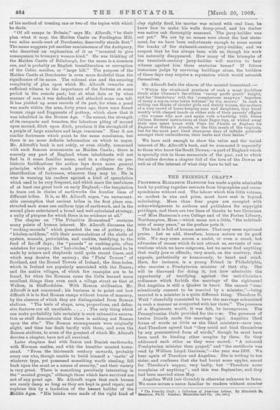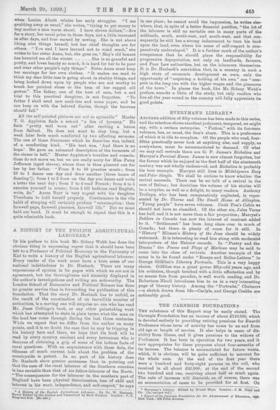THE FRIENDLY CRAFT.*
PROFESSOR ELIZABETH HANSCOM has made a quite admirable book by putting together extracts from biographies and corre- spondences without end. The labour which this little volume, so modest in size and price, must have cost is beyond . calculating. More than four pages are occupied with acknowledgments to authors and publishers for copyright privileges, and there are two lines of thanks to two librarians —of Miss Hanscom's own College and of the Forbes Library, Northampton, Mass.—which mean not a little, "the indebted- ness of many years," as the preface puts it.
The book is full of human nature. That may seem equivocal praise. Let us add, therefore, human nature on its good side. We may come across a zealot, or even a crank, hot advocates of causes which do not attract us, servants of con- ventions which we have outgrown, but we never find anything that really jars or offends; very much, on the contrary, that appeals, pathetically or humorously, to heart and mind. Here, for instance, is a young Friend in Philadelphia, who marries a Presbyterian minister of that city. She will be disowned for doing it, but how admirable the opportunity of testifying against the anti-Christial ordinance which forbids the marriage of the righteous! But Angelina is still a Quaker in heart. She cannot " con- scientiously consent to be married by a minister,"—being married to a minister is a quite different thing. Theodore D. Weld "cheerfully consented to have the marriage solemnized in such a manner as comported with her views." The presence of a Magistrate would, it was felt, be incongruous. The Pennsylvanian Code provided for the cral.. The presence of twelve friends made the marriage legal. Angelina liked forms of words as little as she liked ministers—save one. And Theodore agreed that "they could not bind themselves by any preconceived form of words," though he must have been used to binding other couples by them. So they addressed each other as they were moved. "A coloured Presbyterian minister then prayed," and "the certifiento was read by William Lloyd Garrison,"—the year was 1838. We hear again of Theodore and Angelina. She is writing to her sister, and confesses that she had burnt some apples, meant for Theodore's supper, very badly, but "Theodore never complains of anything "; and this was September, and they bad been married since May.
Angelina Weld (nee Gil mice) is otherwise unknown to fame. We come across a name familiar to readers without number Ti, Friendly Craft : a Collectien of A morican Letter,. By Elizabeth D. Hanscom, FM). London Idaemillan and Co. [Sa. net.]
when Louisa Alcott relates her early struggles. "I am grubbing away as usual," she writes, "trying to get money to buy mother a nice warm shawl. I have eleven dollars,"—five for a story, her usual price in those days, not a little increased in after days, and four earned by sewing. She is not above liking nice things herself, but her chief thoughts are for others. "You and I have learned not to mind much," she writes to her sister Anna, but, she goes on," May's old bonnet
has haunted me all the winter She is BO graceful and pretty, and loves beauty so much, it is bard for her to be poor and wear other people's ugly things." Sister Anna must keep her earnings for her own clothes. "It makes me mad to think my dear little lass is going about in shabby things, and being looked down upon by people who are not worthy to touch her patched shoes or the hem of her ragged old gowns." The father, one of the best of men, but a sad trial to this practical daughter, is not forgotten. "To father I shall send new neck-ties and some paper, and he can keep on with the beloved diaries, though the heavens should fall."
All the self-painted pictures are not so agreeable." Master T. G. Appleton finds a school "a den of tyranny?' He feels "pretty well worn out" after reciting a lesson from Sallust. He does not want to stay long, but a week later feels much comforted by two affecting sermons. The one of these discourses which he describes was, indeed, of a comforting kind. "His text was, 'And there is no hope.' He gave an animated description of the torments of the sinner in hell." Master Appleton's troubles and consola- tions do not move us, but we are really sorry for Miss Patsy Jefferson (aged eleven), whose time is thus planned out for her by her father. "From 8 to 10 practise music ; from 10 to 1 dance one day and draw another [three hours of dancing I]; from 1 to 2 draw on the day you dance and write a letter the next day ; from 3 to 4 read French ; from 4 to 5 exercise yourself in music ; from 5 till bedtime read English, write, Sm." Aaron Burr is very urgent with his daughter Theodosia to bold herself properly. Continuance in the vile habit of stooping will certainly produce "consumption: then farewell papa, farewell pleasure, farewell life." But we must bold our hand. It must be enough to repeat that this is a quite admirable book.











































 Previous page
Previous page